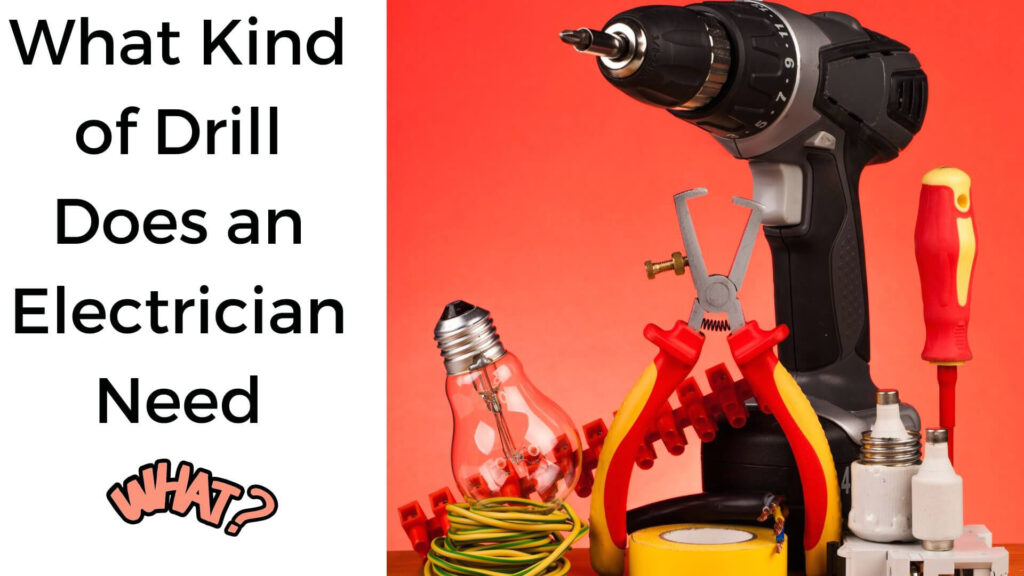When it comes to the essential tools of an electrician’s trade, few items are as important as a reliable drill. Electrical work often requires drilling through various materials, whether it’s drywall, wood, metal, or concrete, to run cables, mount electrical boxes, or install light fixtures. However, not all drills are made equal, and the type of drill an electrician chooses can make a significant difference in both productivity and safety.
In this comprehensive blog post, we will explore the types of drills that electricians need, the specific characteristics of drills that make them ideal for electrical work, and why selecting the right drill is crucial for getting the job done efficiently.
Table of Contents
Overview of the Importance of Drills for Electricians
Electricians regularly face challenging tasks that require precise and powerful drilling. Whether they are working in residential, commercial, or industrial settings, they are often called upon to install electrical wiring, outlets, and lighting fixtures that necessitate drilling through various surfaces. Having the right drill makes these tasks quicker, safer, and more efficient.
Electricians also have to work in tight or awkward spaces, which can make drilling a challenge. That’s why a drill that is portable, lightweight, and easy to maneuver is essential. Additionally, the power of the drill must be sufficient to tackle tough materials like concrete or metal, which are commonly encountered in construction settings.
In short, a good drill is indispensable for electricians, serving as a versatile tool that can handle various tasks, from simple to complex. But with so many types of drills on the market, choosing the right one for electrical work requires a careful understanding of the job’s requirements.
Brief Explanation of Different Types of Drills
Drills come in many varieties, each suited to different applications. For electricians, choosing the right drill can significantly impact the efficiency and ease of their work. Below are some of the most common types of drills used in electrical work:
1. Cordless Drill
A cordless drill is powered by a rechargeable battery, making it extremely portable and easy to use. Electricians often need to move between various locations on a job site, and a cordless drill provides the flexibility to work without the constraint of a power cord. Modern cordless drills are powerful enough to handle most tasks, and they are available with interchangeable batteries to extend run time.
2. Corded Drill
A corded drill offers continuous power, as it is plugged into an electrical outlet. While less portable than cordless models, corded drills tend to be more powerful and can be used for prolonged periods without worrying about battery life. They are ideal for heavy-duty tasks, such as drilling through metal or concrete.
3. Hammer Drill
A hammer drill is specifically designed for drilling into tough materials like brick, concrete, and stone. It combines the rotation of a regular drill with a hammering action that helps break up hard materials. For electricians working in industrial or construction environments, a hammer drill can be a vital tool.
4. Right-Angle Drill
A right-angle drill has a head that is perpendicular to the body, allowing electricians to drill in tight spaces where a standard drill might not fit. This is especially useful when working in crawl spaces, between studs, or around obstacles. Right-angle drills are compact and offer excellent control in confined areas.
5. Impact Driver
An impact driver is designed to deliver high torque for driving screws and bolts. While not traditionally used for drilling holes, impact drivers can be equipped with hex shank drill bits to function as a drill. They are useful for driving screws into tough materials like metal and wood, which is often required in electrical installations.
6. Rotary Drill
A rotary drill is similar to a hammer drill but generally more powerful and used for drilling larger holes in masonry or concrete. It is less common in day-to-day electrical work but can be useful for industrial electricians who need to drill into extremely hard materials.
7. Drill Press
A drill press is a stationary drill mounted to a stand or a workbench. It is typically used for precision drilling in a workshop setting, where accuracy and control are paramount. Electricians may use a drill press when they need to make precise holes in components or metal workpieces.
Importance of Choosing the Right Drill for Electrical Work
Choosing the right drill for electrical work is not just a matter of convenience; it’s essential for safety, efficiency, and productivity. An electrician who has the right tools can complete tasks faster, with greater precision, and with less physical strain. Here are a few reasons why selecting the right drill is so important:
1. Safety
Using the wrong type of drill for a job can lead to accidents or injury. For example, trying to drill through concrete with a basic cordless drill can strain the tool and increase the risk of slipping or jamming. A proper hammer drill, on the other hand, can easily break through tough materials without putting the user at risk.
2. Efficiency
When you have the correct drill, you can work faster and more accurately. For instance, a right-angle drill allows electricians to access confined spaces that would be difficult to reach with a standard drill. This reduces the time and effort required to complete the job.
3. Power
Some electrical tasks require drilling through thick walls, metal studs, or concrete. A drill that lacks sufficient power will struggle with these materials, slowing down the work and potentially damaging the drill. Choosing a drill with adequate power ensures you can handle a wide range of materials.
4. Versatility
A well-chosen drill can handle multiple tasks, reducing the number of tools an electrician needs to carry. For example, a cordless drill with adjustable torque settings can handle both drilling and driving screws, making it a more versatile tool for electrical work.
Characteristics of an Ideal Drill for Electrical Work
When selecting a drill for electrical work, there are several key characteristics to consider. The right drill should be powerful, durable, and versatile, while also being comfortable and easy to use. Here are some of the features electricians should look for in a drill:
1. Power and Torque
Power is a crucial factor when drilling through different materials. Look for a drill with enough torque to handle tough materials like concrete and metal. Most corded drills will provide plenty of power, but if portability is a priority, cordless drills with higher voltage batteries (18V to 24V) are capable of handling most electrical tasks.
2. Variable Speed Control
A drill with variable speed settings allows electricians to adjust the drilling speed based on the material they are working with. Lower speeds are ideal for soft materials like drywall, while higher speeds are needed for harder materials like metal or masonry.
3. Lightweight and Compact Design
Electricians often work in cramped or hard-to-reach spaces, so a lightweight and compact drill is essential. A right-angle drill is particularly useful for accessing tight areas, but even standard drills should be light enough to use comfortably for extended periods.
4. Durability
Since electricians use their drills frequently, it’s important to choose a drill that can withstand heavy use. Drills with metal gear housings and high-quality motors will last longer and provide consistent performance over time.
5. Battery Life (For Cordless Drills)
If using a cordless drill, battery life is critical. Electricians need a drill that can last throughout the day without frequent recharging. Look for drills with long-lasting lithium-ion batteries that offer extended run time and quick recharge capabilities.
6. Ergonomic Features
Comfort is important when using a drill for long periods. Features like a rubberized grip, well-balanced weight distribution, and easy-to-reach controls can make a big difference in preventing fatigue and ensuring precise control.
7. Safety Features
A drill with safety features like an electric brake, which stops the rotation of the bit immediately after the trigger is released, can help prevent accidents. Overload protection is another useful feature, especially in corded drills, as it helps prevent motor burnout during prolonged use.
Common Types of Drills for Electrical Work
Based on the characteristics discussed, here are the most common types of drills that electricians use for their work:
1. Cordless Drills
Cordless drills are perhaps the most popular type of drill among electricians due to their portability and convenience. They are ideal for most electrical tasks, including installing outlets, drilling holes for wiring, and mounting fixtures. Modern cordless drills are powerful enough to handle tough materials, and many offer features like variable speed control and adjustable torque settings.
2. Right-Angle Drills
Right-angle drills are a staple for electricians, as they allow for drilling in tight or awkward spaces, such as between studs or behind appliances. These drills are compact and versatile, making them perfect for tasks like running wires in cramped spaces.
3. Hammer Drills
When electricians need to drill into masonry or concrete, a hammer drill is the tool of choice. The hammering action helps break through tough materials while the rotation creates the hole. Hammer drills are essential for commercial and industrial electricians who work with harder materials.
4. Impact Drivers
While primarily used for driving screws, impact drivers can also be equipped with hex shank drill bits for drilling into tough materials. Electricians use impact drivers when they need high torque, such as when driving screws into wood or metal.
5. Drill Presses
For precision work in a workshop setting, drill presses are useful. Electricians may need a drill press to make precise holes in components or metal pieces when building or repairing electrical systems.
Conclusion
Choosing the right drill is a critical decision for electricians, as it directly impacts the efficiency, safety, and quality of their work. A well-chosen drill can save time, reduce physical strain, and ensure that the job is done correctly. Whether it’s a versatile cordless drill for general use, a right-angle drill for confined spaces, or a powerful hammer drill for tough materials, electricians need reliable, high-quality drills to perform their tasks effectively.
When selecting a drill, electricians should consider the specific requirements of their job, including the materials they will be working with, the location of the work, and the need for portability. By choosing a drill that offers the right balance of power, durability, and ergonomic features, electricians can tackle any job with confidence.

Hey, I am MD Hrithik Hossain, I’m a huge fan of DIY crafts. My workshop is where I spend most of my spare time, and I’m always working on some project. To that end, I’d like to share some of my knowledge and experience with you in power tools, woodworking, and other specialized materials fabrication.
I will guide you with genuine knowledge that can assist you with deciding whether a drill is appropriate according to your requirements or not. If you want to find the best drill and know which type of drill is most suited for your needs, then I can guide you with my expertise. My passion lies in helping others find the correct products they need at an affordable price.


